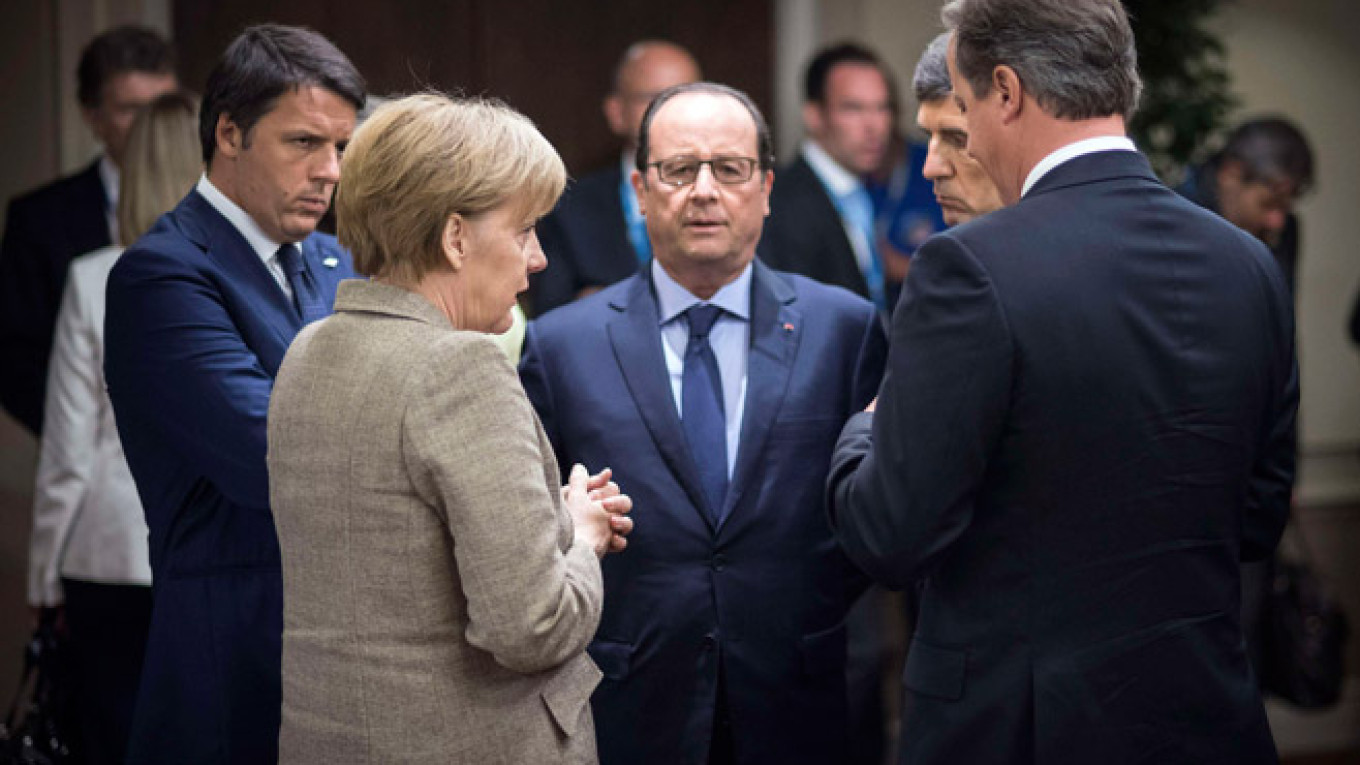The Russian business world is braced for the European Union's unfurling of a fresh round of economic sanctions on Friday, with analysts predicting that Russia's $2 trillion economy will be squeezed even tighter while its companies face isolation from international markets.
A peace plan sketched out by President Vladimir Putin appears not to have deterred EU leaders from their intention to act against what they allege has been a full-scale Russian military incursion into eastern Ukraine in support of separatists fighters battling Kiev.
Ambassadors from the EU's 28 member states discussed new proposals against Moscow on Wednesday ahead of a Friday deadline for agreeing new sanctions.
While the European Commission has said merely that measures will touch on "access to capital markets, defense, dual-use goods and sensitive technologies," leaked reports have given a much clearer picture of what will be targeted.
Dramatic consequences from Friday's likely announcement are unlikely, but the sanctions will have serious consequences over the medium and long term, experts said.
"It is an extension of the financial sanctions that are already in place," said Neil Shearing, chief emerging markets economist at Capital Economics, referring to sanctions imposed in July by the EU and United States in the wake of the downing of Malaysia Airways Flight MH17 over Ukraine.
"The previous sanctions have set a precedent."
The EU earlier prohibited Russian state-owned banks from borrowing in the EU — and key measures discussed this week would widen the ban to include all state-controlled companies, and include syndicated loans, while maturity on debt for state-controlled banks would be cut from 90 to 30 days.
Also, the ban on EU exports of dual-use goods to Russia would be expanded, as would the selling of advanced energy technologies to Russia, according to media reports.
A reported proposal by Britain to block Russia's access to the SWIFT banking transaction system appears to have been quietly dropped.
Cutting Access to EU Capital Markets
The most far-reaching of the possible sanctions is likely to be the severing of all Russian state-owned companies from EU capital markets.
In particular, such a move would hit energy giants Rosneft and Gazprom, hitherto largely unaffected by EU sanctions.
See related article:
Russian companies and banks have to pay off about $100 billion of external debt in the second half of 2014 and more than $110 in 2015, according to rating agency Standard & Poor's.
"Inability to refinance internationally would force corporate borrowers to seek financing from Russian banks. Given the meaningful scale of required refinancing, we believe that the banks would have to rely on the Russian government to finance this gap," a report by the agency said earlier this week.
Others point out that it is not just the technical restrictions that will bite Russian companies.
"The biggest problem is not the sanctions themselves but the wave of negative information that does not appear to be ending. … Even companies that are not sanctioned have difficulty accessing capital," said Alexander Griaznov, director of corporate ratings at Standard & Poor's in Moscow.
No Immediate Fireworks
Experts said they did not expect any dramatic impacts from new sanctions, but warned that the measures would cause serious medium- and long-term pain.
"Russia is protected against short-term shocks, and to have a serious short-term impact sanctions would have to be much more sizable," said Sergei Guriyev, an economics professor and former rector of the New Economics School in Moscow who left Russia last year.
Neither Russian stock markets nor the ruble reacted sharply to the last round of sanctions, and much of the potential impact of a new package of measures appears to be already priced into the market.
Russian officials, who reject EU claims that the Kremlin has intervened overtly in eastern Ukraine, have publicly shrugged off the consequences of sanctions. Putin described the sanctions on Russia as "pricks," on Wednesday, though he added that he would rather avoid them.
Former Finance Minister Alexei Kudrin estimated last month that sanctions will cost the Russian economy up to $200 billion over the next three years, but others point out that the measures could still be causing pain decades down the line.
The lasting legacy of sanctions will be "a low rate of growth, low rate of investment, higher interest rates and a weaker ruble," said economist Shearing.
Restrictions on high technology imports could force down production in the oil industry as companies struggle to exploit maturing Siberian fields and pursue complex Arctic drilling. And economic growth could dry up amid isolation and weak investment.
"The cost of doing business will be even higher and this could contribute to stagnation and even recession," Guriyev said. "A lot of private companies will contribute to capital flight and the role of the state will increase."
Contact the author at h.amos@imedia.ru
A Message from The Moscow Times:
Dear readers,
We are facing unprecedented challenges. Russia's Prosecutor General's Office has designated The Moscow Times as an "undesirable" organization, criminalizing our work and putting our staff at risk of prosecution. This follows our earlier unjust labeling as a "foreign agent."
These actions are direct attempts to silence independent journalism in Russia. The authorities claim our work "discredits the decisions of the Russian leadership." We see things differently: we strive to provide accurate, unbiased reporting on Russia.
We, the journalists of The Moscow Times, refuse to be silenced. But to continue our work, we need your help.
Your support, no matter how small, makes a world of difference. If you can, please support us monthly starting from just $2. It's quick to set up, and every contribution makes a significant impact.
By supporting The Moscow Times, you're defending open, independent journalism in the face of repression. Thank you for standing with us.
Remind me later.


